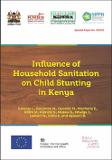Special Paper No. 07 of 2024 on Drivers of Stunting Reduction in Kenya
Publication Date
2024Author
Type
Otherviews
downloads
Metadata
Show full item recordBy
Nyabaro, Violet; Mugo, Florence; Waweru, Grace
Abstract/
Stunting, a significant public health concern, affects millions of children globally, including those in Kenya. Significant progress has been made, which led to stunting reduction from 26 per cent in 2014 to 18 per cent in 2022. Notwithstanding, stunting remains a major challenge in the country, with the prevalence being higher in rural areas and among children from poorer households. The overall objective of the study was to identify the factors that drive the reduction of stunting in Kenya and identify evidence-based practices that can be used. The study characterized stunting prevalence by various factors and examined the drivers of stunting in Kenya in the overall population and by place of residence. The Kenya Demographic Health Surveys of 2014 and 2022 were used in undertaking the analysis. The study finds that maternal education significantly reduces both overall and severe stunting prevalence, with secondary education being more effective than primary education. The highest impact on stunting reduction is observed among children of mothers with post-secondary education. Regression analysis indicates that stunting prevalence is higher among children of teenage mothers while children of unemployed mothers have lower stunting rates. Stunting prevalence is highest among children of working mothers, particularly those in the agricultural sector. Access to improved water sources had a protective effect on stunting prevalence and increased access to improved sanitation consistently reduced stunting prevalence. Finally, higher household income is associated with lower overall and severe stunting prevalence, where stunting reduction is evident in children from non-poor households compared to poor households. Elimination of stunting requires concerted efforts that are multisectoral. These include enhancing access to maternal education to improve the knowledge and skills of mothers on nutrition, childcare, and health practices by expanding access to education for girls and women and strengthening community engagement and utilize media campaigns to promote antenatal care visits. Although access to work opportunities and higher incomes is crucial for mothers, it is essential to strengthen the implementation of existing workplace policies for maternal and child health. This includes ensuring flexible working hours and enforcement of decent work guidelines in sectors such as agriculture to create a supportive work environment for working mothers. There is also a need to expand access to improved sources of water and improved sanitation to keep up with needs of the expanding population.
Publisher
National Information Platform on Food and Nutrition (NIPFN)Series
SP/07/2024;Collections
- NIPFN [24]
Related items
Showing items related by title, author, creator and subject.
-
Discussion Paper No. 319 of 2023 on Socio-Demographic Effects of Child Stunting in Arid and Semi-Arid Regions of Kenya
Mang'eni, Elizabeth & Maitai, Jedidiah Muriithi (The Kenya Institute for Public Policy Research and Analysis (KIPPRA), 2023)Maternal and child health (MCH) is a global priority, yet child stunting remains a significant concern particularly in arid and semi-arid regions of Kenya. This study investigated the socio-demographic factors influencing ... -
Household Characteristics Associated with Stunting
National Information Platform for Food Security and Nutrition (National Information Platform for Food Security and Nutrition, 2021-12)The Household Characteristics Associated with Stunting publication by the National Information Platform for Food Security and Nutrition (NIPN) investigates the household-level factors associated with stunting among children ... -
Special Paper No 03 of 2023 on Influence of Household Sanitation on Child Stunting in Kenya
Karanja L.; Karumba M.; Opondo M.; Macharia E.; Kiriro M.; Kipruto S.; Musavi E.; Ntwiga J.; Laibuni N., Kihiu E. & Nyasani B. (National Information Platform for Food Security and Nutrition, 2023-04)The Influence of Household Sanitation on Child Stunting in Kenya publication by the National Irrigation Programme Focus for Nutrition (NIFPN) investigates the relationship between household sanitation and child stunting ...




